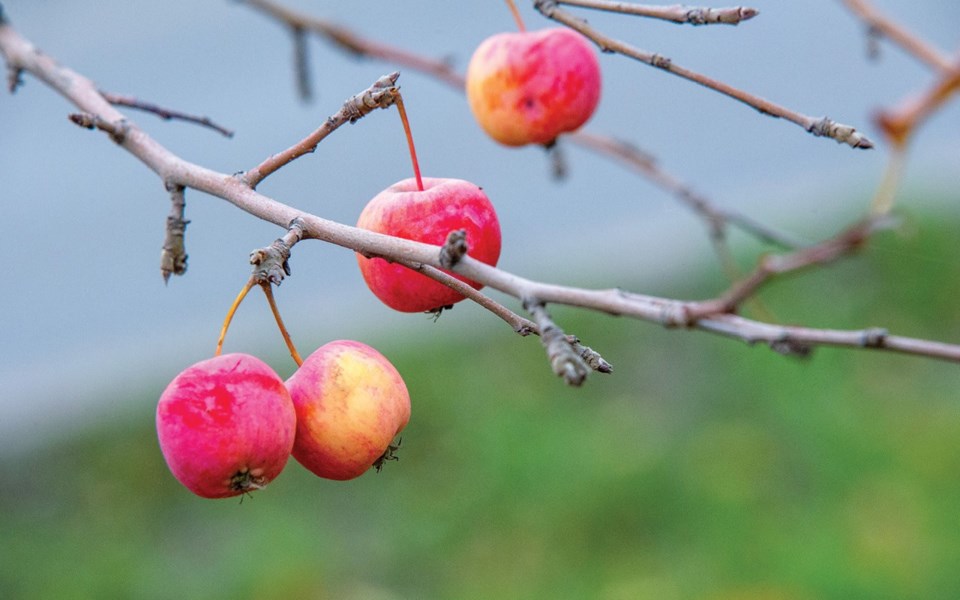The Village of Pemberton (VOP) has decided to cut down the iconic crabapple trees that line Portage Road following a letter from the Conservation Officer Service (COS) and unsuccessful attempts to manage the fruit they produce.
"Unfortunately, you just can't have that level of bear attractant right in the middle of your high-traffic walking area," said VOP Mayor Mike Richman. "We've done what we can to try to lessen the attractant."
For the past few years, the VOP has worked with Stewardship Pemberton to keep fruit off the trees. With the help of volunteers, the organization has collected crabapples and made jelly out of them. (The jelly, in turn, is sold at local grocery stores in support of the conservation organization.)
The VOP, added Richman, has also had its public works staff "blow off all the blossoms with fire hoses in an attempt to keep them from producing too much (fruit)."
But neither effort, it appears, was enough to keep the crabapples at bay—bear sightings, along Portage Road, are common. "You will walk by, and there will be a bear in (a) tree," said Richman, noting that the trees run directly in front of Signal Hill Elementary School. "It's too public an area and it's too well travelled an area (for that)."
Dated Oct. 19. 2018, the COS letter states that bears are becoming "conditioned and habituated as a result of being attracted" to the crabapple trees.
"Every year, bears are destroyed because they pose a public safety risk or they cause significant damage to property ... this wildlife attractant has a significant risk to safety of the residents and visitors of Pemberton," said the letter. "It is compulsory that you take immediate and appropriate action to ensure that the Village of Pemberton does not continue to operate in contravention of the BC Wildlife Act."
The letter presented several options to address the attractant problem: Removing all of the trees, securing them through electric fencing, or collecting "all fruit from the trees as soon as trees bear fruit yearly."
The COS letter has left the VOP with no choice, said Richman. "It's an order," he said. "It wasn't a conversation. It wasn't a suggestion or recommendation. It was an order that you need to remove those trees.
"Basically what they said is, 'What you are doing is not working well enough and you need to remove it.'"
When Pique spoke to Richman about the crabapple issue in October (see "Village crabapple trees cause for concern, says conservation group," Oct. 14, 2018), he said the VOP was seeking to avoid cutting down the trees and considering transporting some of them to the VOP's agricultural park.
When asked about this option last week, Richman said it would be prohibitively expensive and, in many cases, unfeasible.
"We did speak to an arborist a little while ago, and there were two things," explained Richman. "No. 1, they are very well-established trees, so to remove them you would have to dig really wide around" and the machinery "would be very costly."
Moreover, a number of the trees are located under hydro lines, making it impossible to use machinery to take them out, said Richman.
Complicating matters further is the fact that the trees are imbued with cultural significance, as they were planted in honour of Pemberton residents and people who have contributed to the betterment of the community.
Some posts on social media have questioned the VOP's decision to cut them down.
Richman said he understands the concern and that the VOP is taking steps to honour the memories of the people they were planted for.
After cutting the trees down, it will immediately replant non-fruit-bearing species (perhaps lilac or maples), and erect signage in honour of the people the trees were originally dedicated to, he explained.
"The older residents will be listed there, the dedications will be listed there on a sign, so people will understand, which will be good, because there is (currently) nothing there indicating (the significance)," he explained.
Richman added that the VOP is open to working with any families to relocate trees, if it is feasible. "If people are interested, it would have to be at their own cost to have the transplant done," he said. "But at this point, we don't know what the cost (would be)."
The VOP plans on commencing with the project in the spring, with tree removal slated to start in April.




